Mary Kingswood's Blog
October 28, 2025
Review: Althea by Madeleine Robins (1977)
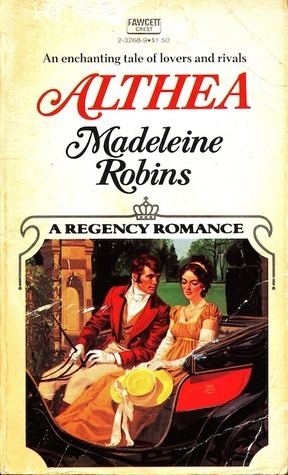 This one was a joy to read. The exchanges between hero and heroine are genuinely witty, both are interesting characters, the side plots are realistic and it’s beautifully written.
This one was a joy to read. The exchanges between hero and heroine are genuinely witty, both are interesting characters, the side plots are realistic and it’s beautifully written.
Here’s the premise: Althea Ervine is treated more like a housekeeper than a daughter of the household. Her father and brother seem incapable of managing without her, but when she tires of being taken for granted and escapes to her married sister in London, Mary takes up her cause with enthusiasm and determines to rig Ally out in fashionable style and give her a wonderful time.
And a wonderful time she does indeed have, being pursued by handsome, charming Edward Pendarly, and then there’s Sir Tracy Calendar, with whom she exchanges scintillating and witty banter (which is genuinely funny, by the way, unlike much so-called witty banter to be found in modern Regencies). Sir Tracy — actually, hold it right there for a moment. I hate, hate, hate this as a male name, but I’m told it is an authentic Regency name, so… {shrug}. But authors, please don’t be tempted.
Where was I? Sir Tracy {rolls eyes} makes some cryptic remark about Pendarly, which is actually intended to warn Ally that he is already betrothed (as the reader already knows), but Ally takes it as a curmudgeonly insult against the handsome, charming etc Edward, and decides to dislike Tracy. When she finds out the truth, and Tracy takes the opportunity to rush to a proposal, she accepts in a fit of pique.
So far, so very conventional Regency. It’s a pity that heroines don’t establish, with every offer from the hero, his precise reasons for making it, so that they don’t agonise for endless chapters over it, and would find out at once, instead of waiting for 200 pages, that he loves her, but then I suppose most novels would collapse to the length of a short story. Anyway, Ally doesn’t, but her agonisings aren’t as tedious as such things usually are, partly because Tracy understands her state of mind perfectly and makes allowances, and partly because he displays just that degree of unruffled calm in the face of her turbulence that is so appealing in a hero. I can cope with a heroine who gets in a tizz, but there are very few heroes who are improved by such behaviour.
Tracy lapses into a bit of a tizz himself late in the book, which I thoroughly disapproved of. Heroes who want to win their lady in the end need to stick close to her, and for heaven’s sake, how hard can it be to tell her you love her? But no, Tracy goes wandering off, and then has to do some chasing to catch up with her, and convince her that he really does love her. But of course he does the right thing in the end, and all ends just as expected.
There are a few anachronisms but nothing to stop me enjoying this totally. Five stars.
Review: The Determined Bachelor by Judith Harkness (1981)
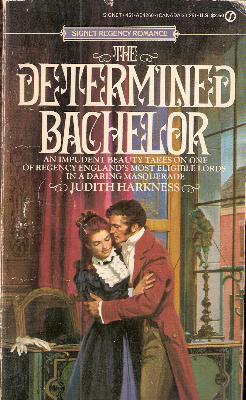 I enjoyed this up to a point, but I found it by far too wordy, with too little actual plot and too much philosophical wrangling.
I enjoyed this up to a point, but I found it by far too wordy, with too little actual plot and too much philosophical wrangling.Here’s the premise: Anne Calder is the despair of her family, choosing not to marry and thereby getting in the way of her younger sisters’ prospects, and preferring to write novels than look for a husband. Her first novel, based on the country life she knows well, is to be published soon, and she wants to write a follow-up on town life, but how can she, with so little knowledge of it? So she devises a cunning plan – she will take a position as a lowly governess in town, masquerading as the impoverished daughter of a country parson, and gain some experience of town life that way.
Now, this is an excellent start – a governess who actually isn’t a downtrodden and impoverished not-quite-a-lady, and who doesn’t in fact need the job at all. One could quibble at her taking up a position that could be given to someone who actually needs it, and also at the selfishness of worming her way into a child’s affections for what must be only a temporary position, but never mind.
She finds work with Sir Basil Ives, the determined bachelor of the title, a distinguished diplomat and ambassador, who has just become guardian to Nicole, a child of nine, and hasn’t the first clue how to deal with her. At first he thinks his cousins, who have children of their own, might be prevailed on to take her in, but he quickly sees that they’re unsuitable so he engages Anne as a governess. He’s very stiff and, frankly, unlikable, but he has the good sense to realise that Anne knows how to deal with children so he starts to unbend sufficiently to ask her advice.
Nicole is one of those precocious children who would be insufferable in real life, but is made to seem cute on the page, so I’ll let her off that. And Anne is just so very accomplished at… well, absolutely everything, but she’s the heroine, so I suppose I’ll let her off that, too. But Basil… well. We get glimpses of a softer, more relaxed Basil, but we never see him actually fall in love with Anne. If I’m being generous, I’ll concede that it’s all there but written between the lines, but it’s written in such small letters that it’s almost impossible to see. So when, most of the way through the book, he finally reveals his feelings, it’s a case of about time, too!
I never did quite work out his family relationships. There’s some suggestion that he’s in line to inherit his cousin’s earldom through his mother, but that’s unlikely (without a bit more explanation) so I ignored it. And then at the end, he does inherit, even though the cousin had sons, which made no sense to me at all, so I ignored that, too. But in a book of this vintage, ie pre-internet, I forgive a certain amount of fudging of historical details.
I did manage to read this to the end, if only to see how stiff old Sir Basil finally unbends, but I can’t say I enjoyed it very much. The interactions between hero and heroine tended to be of a high-flown philosophical nature, with absolutely nothing romantic about them, and the heroine’s inner musings were not much better. Besides that, very little happened apart from one misunderstanding near the end, although it was an understandable misunderstanding, if you see what I mean, and therefore forgivable. It is very well written, however, with only a smattering of Americanisms and other oddities, so I’ve given it three stars.
Review: Madcap Miss by Joan Smith (1989)
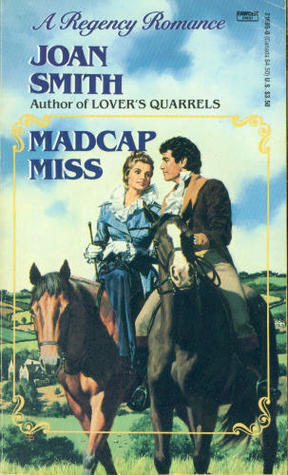 This was a whole heap of fun! I despise plots where the heroine disguises herself as a boy, but this one masquerades as a child, leading to all sorts of entertaining results, like being given warm milk to drink instead of wine, and being expected to play with skipping ropes and dolls! A very original story.
This was a whole heap of fun! I despise plots where the heroine disguises herself as a boy, but this one masquerades as a child, leading to all sorts of entertaining results, like being given warm milk to drink instead of wine, and being expected to play with skipping ropes and dolls! A very original story.
Here’s the premise: Grace Farnsworth, an orphaned lady come down in the world, has lost her job as a governess. Eking out her last pennies to get back to the safety of her former governess’s house, she disguises herself as a child to get a lower fare on the stage coach. She completely fools the coach driver and the two other passengers, a nosy matron and a well-to-do man whose own carriage has broken down. But when Grace arrives, she finds her friend has gone out of town, and she has no money and nowhere to go. Confiding in the sympathetic man from the stage, he makes her an offer: pose as his daughter for a couple of days to fool his elderly grandmother, and he’ll pay her a hundred pounds. Grace agrees, but it turns out to be more difficult than she’d thought.
Quite apart from the milk and dolls problem, there’s Grace’s very adult appetite to contend with, since grandma has very fixed ideas about what young girls should eat. But at least her benefactor, now revealed as an earl (because of course he is!), Lord Whewell (any ideas on pronunciation? No, me neither) is a bit of a charmer, who comes to her room every night and chats easily about this and that, in a perfectly avuncular manner that arouses no alarm in Grace or gentlemanly concern in him.
But gradually, and it really is very, very gradual, they both come to see each other in a different way. I really liked the way this is done, the first hint being the fact that he shaves before dinner on the second night, having discovered that grandma expects Grace to dutifully kiss her papa before bed each evening. That is such a small detail, but it completely sets up the whole process of falling in love. To be honest, I would have liked a little more awareness from him, since he’s not a callow youth but a previously married man, so he should have seen right from the start where his own feelings were heading. But the middle section of the book is very muddled about whether he’s falling in love or just likes her in a fatherly way. As for Grace, she sees him as old (he’s thirty-five to her twenty-two, which isn’t outrageous for the era), so it never occurs to her that he might have marriage in mind.
The second half of the book is a glorious string of improbable encounters with people who know one or other of the two in different ways, which call for some creative story-telling from our hero and heroine so as not to be rumbled, or to have something worse suspected. This is all deliciously funny, and if it takes the hero a couple of attempts to get his proposal right, everything works out fine in the end, naturally, with a resounding finale. Terrific fun. Five stars.
Review: A Rival Heir by Laura Matthews (2002)
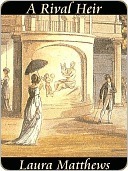 An oddly disjointed book, which I found difficult to get into, although I’m not sure why. The hero and heroine were perfectly fine, the romance burbled along nicely and there was a great deal of Regency restraint and propriety on display, which is all estimable. Yet somehow I was unmoved.
An oddly disjointed book, which I found difficult to get into, although I’m not sure why. The hero and heroine were perfectly fine, the romance burbled along nicely and there was a great deal of Regency restraint and propriety on display, which is all estimable. Yet somehow I was unmoved.
Here’s the premise: orphaned Nell Armstrong has lived with her cantankerous spinster Aunt Longstreet for ten years, during which time she’s gone nowhere, met no one, done nothing except watch her aunt alienate the neighbours. Now the aunt has decided out of the blue to travel to Bath (from Westmorland!) to take the waters, even though other spas like Harrogate are much closer. Nell is suspicious, but a trip is a trip and she’s determined to make the most of it. At Bath, they meet the aunt’s godson and heir, Sir Hugh Nowlin, and his lively sister Emily, who take Nell under their wing. They both feel sorry for her, living with her difficult aunt, and try to improve her life in their different ways. Hugh would like to improve his own by marrying her, but there’s a problem: he’s broke and he doesn’t know which of them will end up inheriting the aunt’s estate, and if it’s Nell, he can’t possibly court her.
There’s a mystery in the aunt’s history involving recently widowed Lord Westwick, and there’s some minor business with Emily’s husband and a librarian who is set up as a rival for Nell’s affections, but essentially this is the story. I didn’t dislike Hugh or Nell, although they both seem rather too good to be true, what with Hugh agonising over whether he can marry Nell or not, and Nell regarding herself as bound by a deathbed promise years before. As for Lord Westwick, he is a positive fairy godfather, although there might be plot reasons for that. In fact, Aunt Longstreet is the only character who has any kind of bad traits in her makeup at all.
All of this makes the story just a shade dull. I really wanted something melodramatic to happen to shake things up (and it’s not often I say that). In the end, people behave rationally, find logical ways round the constraints that held them back and only the librarian’s story doesn’t get much of a look in at the end. Still, it’s nicely written, if you don’t mind the usual array of Americanisms (gotten and the like), and if it doesn’t have much emotional depth, it’s still a pleasantly enjoyable read. Four stars.
Review: The Bestowed Bride by Christina Dudley (2025)
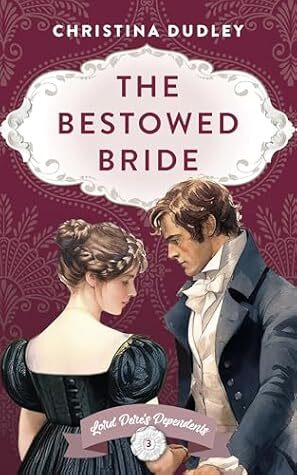 A Christina Dudley book is always a joy to read, that goes without saying, and this one was no different, but it has one major negative about it, which dragged it down to four stars for me.
A Christina Dudley book is always a joy to read, that goes without saying, and this one was no different, but it has one major negative about it, which dragged it down to four stars for me.
Here’s the premise: widowed Sarah Barstow still grieves for her dead sailor husband, but at least she has her little son Sebastian (Bash) to console her, and she has a comfortable home with her husband’s family, under the benevolent patronage of their relation, Lord Dere. But when her husband’s best friend, Horace Langworthy, arrives on her doorstep, armed with her husband’s instruction to ensure that Sarah and Bash are well looked after, even to the extent of marrying Sarah, the even tenor of her life is upended. Horace’s proposal is duly made and just as duly rejected with extreme prejudice, even though he’s still heartbroken that the woman he loved and with whom he had an understanding, has jilted him during the two years he was away.
From then on, since Horace decides fr his own reasons to stay in the neighbourhood a bit longer, the two circle warily round each other and begin to appreciate the good qualities in each other. In particular, they both come to understand what it was that the dead Sebastian valued and loved in them. And so they inch towards valuing and loving each other too. I love these slow burn romances, and this is as good as they come.
Of course, the author’s great skill is in depicting large, rambustious families, full of personality and the usual disagreements, but also fiercely loyal, and the Barstows are a classic of the type. This series also has perhaps my favourite of all the characters, the mild-mannered Lord Dere, who meekly allows himself to be manipulated by his redoubtable sister-in-law, but who has a wonderfully soft heart. He acts as the fairy godfather of the series, stepping in to rescue our hapless heroes and heroines when they get into too much of a mess. Here he seems to be more proactive than previously, indulging in a spot of match-making.
As expected from Dudley, the book is beautifully written, laugh out loud funny in parts, and with the usual convoluted muddle to ensnare the main characters, beautifully resolved, and the romance is lovely. So why only four stars? Because with a romance, I expect the hero and heroine to be together at the end, not separated for months and years on end. I can see the logic behind it, it was consistent with the characters themselves and it’s perfectly true to the era, so rationally I can’t fault it, but the irrational part of me ended up rather grumpy about it. So four stars it is.
Review: The Solicitor’s Wife by Iris Lim (2025)
 A fun little novella, which drew me in by the plot device of an arranged marriage with switched brides. I’m always fascinated by the legalities of Regency marriage so I was keen to see how the author would tackle this.
A fun little novella, which drew me in by the plot device of an arranged marriage with switched brides. I’m always fascinated by the legalities of Regency marriage so I was keen to see how the author would tackle this.
Here’s the premise: Rupert Iverson is a well-established solicitor who arranges a marriage to a demure, biddable wife. What he doesn’t know is that the proposed wife is in love with someone else (an apothecary’s apprentice – good luck with that!) and so her identical twin sister takes her place, and she’s not at all the biddable sort. Hoyden would be a more apt description. For her part, Ruby Galeheart hasn’t thought much about the marriage beyond saving her sister, so it’s a surprise to discover that her husband is rather an agreeable sort, who doesn’t seem to mind when she creates all sorts of chaos.
Now, this is a wonderful premise for a book, and of course the reader is on tenterhooks wondering what will happen when Rupert realises that he’s been duped. And then there’s the even more intriguing question – is the marriage even legal? Happily, the author doesn’t attempt to whitewash over the consequences, and since Rupert is a solicitor who knows the law, he has no hesitation over the legality or otherwise of the situation, and what needs to be done about it.
The book is too short to have much depth beyond the basic plot, but even so, the characters are not mere cardboard cutouts, and the story is an engaging and amusing read. I have one or two historical quibbles, namely, Rupert would be an attorney at this date, not a solicitor (which was a much more specific and unusual sort of lawyer), and there would only be one wedding ring at the ceremony, not two (husbands didn’t wear wedding rings until well into the twentieth century). None of that mattered much, though. This is a fun little read, short but sweet. Four stars.
September 9, 2025
Review: Summer Campaign by Carla Kelly (1989)
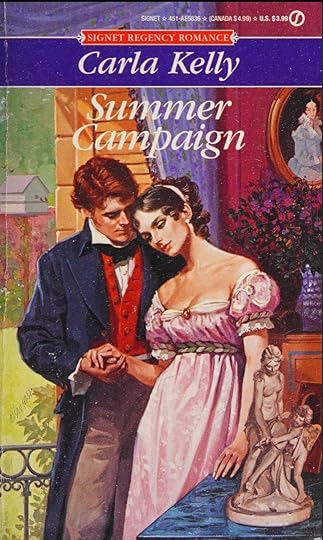 A strange book, with some very unsettling mood changes, intermingling light-hearted banter with much more serious matters. Very enjoyable, despite that, although I wish the author had lightened the mood somewhat at the end.
A strange book, with some very unsettling mood changes, intermingling light-hearted banter with much more serious matters. Very enjoyable, despite that, although I wish the author had lightened the mood somewhat at the end.
Here’s the premise: Onyx Hamilton and her twin brother Gerald were abandoned at birth on the steps of a parsonage. The parson took them in and raised them, but when he died and his wife made a somewhat better (ie higher ranked) marriage, the foundlings became unwanted, especially as Mama now had a daughter of her own, Amethyst, who’s as spoilt and pampered as Onyx is neglected. Bit of a Cinderella vibe at this point.
In adulthood, Gerald joins the army and dies (the first of the downer moments that infest the book). Onyx is disposed of by the expectation that when a slimy parson proposes, she will accept him. Onyx has survived her miserable life by doing exactly as she’s told, so accept him she does. She’s dispatched to the parsonage which needs to be renovated before they can marry and move into it, and she’s expected to do all the work. In the meantime, she’ll have the reluctant support of the local big cheese, Lady Bagshott.
What I’ve written so far sounds fairly straightforward, doesn’t it? But very little of it was spelled out so clearly. A little more exposition would have been a great help in working out who was related to whom and to what degree. For instance, it wasn’t at all clear to me for a long time that the Lady Daggett who was so hard on Onyx was her adoptive mother, or that Amethyst was effectively her sister.
The journey to the parsonage is where things go off the rails, for the carriage suffers a breakdown, and when the coachman goes off to fetch help, Onyx and her maid are attacked by highwaymen. Of course they are, for how can there be a self-respecting Regency novel of this vintage that doesn’t have at least one highwayman, kidnapping or elopement? Or sometimes all three.
Happily, the ladies are rescued by the hero arriving in the nick of time, because of course he does. He and Onyx see off the robbers, but our hero, Major Jack Beresford, is wounded in the altercation. Of course he is (because this book is a positive trope-fest).
So it’s off to the nearest farm for some recuperation, and this is the weirdest journey imaginable, and the point where the story can’t make up its mind whether it wants to be a tragedy or a farce. Jack has been losing blood fast and he’s drifting in and out of consciousness, but whenever he happens to be awake, he’s bantering and downright flirting with Onyx, and not in a gritted-teeth, distracting himself from the pain sort of way, either. For two minutes, he’s as light-hearted as if he were in a ballroom, the next moment he’s swooned clean away again. It’s very peculiar, and frankly, downright unsettling.
This odd mood roller-coaster continues for several days at the farm, where one moment Onyx and Jack are making up false, but very funny, background stories (they’re a married couple with a three-year-old child, apparently) to satisfy the prudish farmer’s wife, the next Onyx is fishing bone fragments out of Jack’s wound.
But then Onyx’s slimy parson turns up, prepared to be outraged but is sweet-talked into allowing Onyx to take Jack off to Lady Bagshott for recuperation. From here on, the romance becomes a little bit more conventional. Jack gets serious and proposes, Onyx throws over her slimy parson and … wait a minute, no she doesn’t, she turns Jack down. Now, seriously, why would she… why would any rational woman turn him down? He’s cute, he’s fun, he loves her… oh yes, and his brother is a marquis (which he forgot to mention) so no shortage of money. It’s madness. There seem to be no real issues, except for the whole ‘I’m not worthy’ thing. Sigh.
The odd thing (OK, another odd thing) is that Jack doesn’t fight her decision at all. He simply accepts it, so although the title of the book is ‘Summer Campaign’, and you’d expect that to be Jack’s campaign to win Onyx, he really does very little in that line. I won’t say he’s entirely passive, but he never really fights for her (as a hero should, in my opinion).
The latter part of the book is another huge downer, and even the banter is lacking at this point. To be honest, I might have given up at this point, except that I really wanted to see how the two would get together in the end – whether Jack would become all manly or whether Onyx would realise what she was throwing away. And I also hoped for an upbeat ending for the huge downer, because frankly I couldn’t quite see the point of all the misery. Romances are supposed to be light-hearted froth, after all.
There are a few Americanisms scattered about – bay rum, for instance, and visit with and we don’t have grackles in England. Nor could you get a special licence from Leeds, or anywhere but Doctors’ Commons, London. And Jack, as the son of a marquis, should properly be addressed as Major Lord John Beresford, or Lord John, but he never was. None of this bothered me overmuch. I wavered between three and four stars, but in the end I enjoyed it pretty well, so four stars it is. But don’t read it if you’re already feeling a bit down.
Review: The Phantom Lover by Elizabeth Mansfield (1979)
 A charming tale that’s fairly predictable, but no worse for that. I’m not sure that the rather arm-wavy attitude to war wounds passes muster in this day and age (this book is close to fifty years old!) but I was grateful to be spared too many of the gory details.
A charming tale that’s fairly predictable, but no worse for that. I’m not sure that the rather arm-wavy attitude to war wounds passes muster in this day and age (this book is close to fifty years old!) but I was grateful to be spared too many of the gory details.Here’s the premise: Captain Henry (Harry) Thorne is fighting Napoleon when he learns that he’s become the Sixth Earl of Thornbury. There’s just one problem – his final battle leaves him so injured that he loses one leg, which, combined with the vagaries of war, means that it’s some time before he returns to England, and all he wants is to retreat to his most remote estate and hide away from the world. Meanwhile, in London, his relations are hoping he’s dead, but until that’s certain, they can’t claim the estate and their debts are growing. The only answer is to marry their ward, Nell Beldon, to the nearest rich suitor. But she’s a spirited (ie flighty) soul, and she ditches him – her third jilting! Her guardians despatch her to a distant estate until she’s prepared to do their bidding.
Well, there could be any number of remote estates owned by the family, but naturally the two end up at the same one, where Nell finds the family taking care of the house strangely reluctant to welcome them. In fact, they’d be very pleased if they’d just turn round and go back to London, because after all, they wouldn’t want to stay in a haunted house, would they?
Nell would, actually, and when she’s treated to clanking chains and ghostly apparitions at midnight, she’s by turns amused, intrigued and then curious. Who is this mysterious ghost? It’s not a spoiler to reveal the answer – it’s in the blurb, after all. The ghost is none other than Harry Thorne, so keen to be left in peace that he’s prepared to drive his unwanted visitors away. Nell tumbles to it pretty quickly, and sets about convincing the reluctant earl to take up his rightful place in society. He isn’t convinced, but all those intimate midnight conversations, where the normal bounds of propriety seem not to apply, have had their usual effect, and the two are well on the way to falling in love.
But there’s a wrinkle. Before he went off to war, Harry was sort of (but not quite) betrothed to a very respectable girl, and Nell knows that she’s still not married or even betrothed. She’s waiting for her hero to return, and Harry really needs to do the honourable thing and see her again, missing leg or no missing leg. And so the second part of the book leaves behind the charming Cornish setting and becomes a more conventional Regency in London, where both Nell and Harry wrestle with their consciences and their feelings.
The resolutions to these knotty problems are totally in keeping with their characters, and (in Harry’s case) delightfully original. A lovely romance, an unusual premise, beautifully written (albeit with a few Americanisms) and a thoroughly enjoyable read. A good four stars.
Review: The Kissing Bough by Joan Smith (1994)
 Possibly only a three star in some ways, but I was in the mood to overlook its flaws and just enjoy the romp. Nothing special, in a lot of ways, but a good comfort read.
Possibly only a three star in some ways, but I was in the mood to overlook its flaws and just enjoy the romp. Nothing special, in a lot of ways, but a good comfort read.Here’s the premise: It’s almost Christmas, and Colonel Nick Morgan is returning from the wars to his uncle’s home. His uncle is elderly, frail and a bit gaga, and Nick is his heir presumptive. Soon he’ll inherit, so what he needs is a wife, right? And who better than his childhood friend, the rather lovely Jane Ramsey. The ladies of the house are confident that’s what he’ll do. Jane herself isn’t so sure. Even so, it’s a shock when Nick turns up with a very lovely and very immature future wife on his arm. Aurelia is the daughter of a brewer, very rich, very spoilt, very town-bred and entirely unsuitable for country boy Nick.
At first, he makes allowances for her and assumes they’ll learn to accommodate each other’s wishes, but when her vulgar relatives arrive, and he sees Jane being the focus of attention from two other men, he begins to realise he’s made a dreadful mistake. The way he contrives to escape his now unwanted betrothal with his honour intact (because a gentleman does not jilt a lady) is certainly creative, and I’m not going to spoil the surprise by saying anything about it. In fact, this is just about the only surprise in the entire book, since everything else is telegraphed in very large letters. There are also a fair sprinkling of anachronisms and the like – Aurelia is called a fiancee throughout, for instance, a term not in use at this time.
Despite all of this, the book is a lot of fun, Nick’s little plan is clever and there are some very entertaining characters, like the slightly potty uncle, the vulgar relations and the indolent friend who half-heartedly courts Jane. An enjoyable if not outstanding read. Four stars.
Review: A Prior Engagement by Elizabeth Mansfield (1990)
 A terrific read, the first book for ages that’s had me so spellbound that everything else got neglected so that I could carry on reading. One of those tales with such an arresting premise that you just have to know how it all works out.
A terrific read, the first book for ages that’s had me so spellbound that everything else got neglected so that I could carry on reading. One of those tales with such an arresting premise that you just have to know how it all works out.Here’s the premise: Genevra (Jan) Hazeldine is toppling headfirst into perpetual spinsterhood at the age of twenty-eight. She’s had innumerable offers and rejected all of them, but there’s one she can’t forget – her first, to Max, the Marquis of Ollenshaw. He was a rake who seemingly couldn’t change his ways even when he was in love with Jan, so she jilted him but she just can’t forget him. Instead she buries herself in her music, being a talented violinist. When her young cousin tells her she’s betrothed and invites her to the wedding in Bath, Jan is delighted to accept, only to discover with horror that Belinda’s betrothed is none other than Max.
Now this is a wonderful situation, with faint echoes of Heyer’s Bath Tangle (but almost every modern Regency has echoes of Heyer – she invented all the tropes, after all). The difference here is that Max behaves far better than Rotherham did. At no point does he try to cry off from his engagement. He talks sensibly to Jan, agrees to keep their prior betrothal from Belinda, at least for a while, does his best to keep Jan, if not at arm’s length, then at least not to pay her too much public attention, and plays the complaisant suitor to Belinda. And Jan, too, behaves well.
Naturally, such a situation can’t last, and the author dreams up a spectacular way for them to betray their feelings. From there on, things become increasingly unstable and reach a resolution without any machinations from the main characters. Along the way, there are two minor romances to enjoy.
For the pedantic (like me) there are a fair few Americanisms that slipped in, but I was enjoying the story too much to care. There are some questionable plot issues, too. For instance, Max is said not to like music at all initially, yet he attends a musical evening where he is entranced by Jan’s violin playing. And then, after he jilts her, they don’t meet again for eight years – how on earth did he manage that, when they moved in the same very limited circles? Surely they must have bumped into each other at some point?
But none of that troubled my enjoyment of the book. Highly recommended. Five stars.



